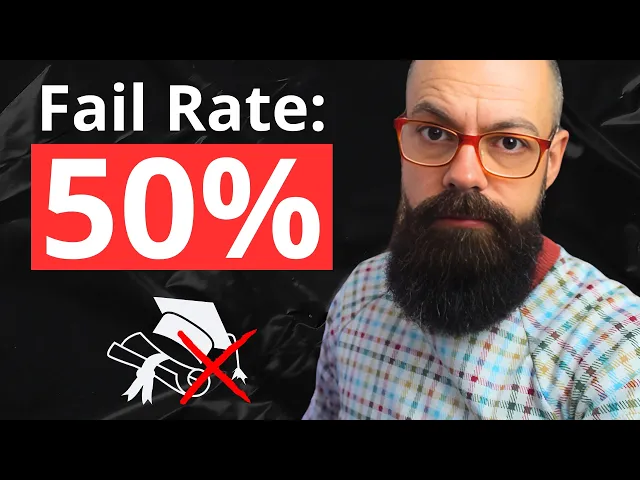The Brutal Truth: Why 50% of PhDs Never Finish

Brutal realities behind PhD dropout rates
In academia's imposing marble halls, a silent crisis unfolds with half of all doctoral candidates abandoning their pursuit before completion. The romanticized image of scholarly achievement collides harshly with reality as bright, ambitious minds quietly exit programs that were meant to define their intellectual legacy. Dr. Andrea Jones-Rooy's recent video confronts this uncomfortable truth with refreshing candor, pulling back the curtain on why the doctoral journey breaks even the most promising students.
Key revelations about PhD attrition
-
Structural barriers dominate the dropout equation – Beyond personal grit or intelligence, institutional factors create nearly insurmountable obstacles. From limited funding opportunities that force candidates to juggle poverty-line stipends with teaching responsibilities to misaligned incentives where professors prioritize publication over mentorship, the system itself works against student success.
-
Mental health deteriorates predictably under PhD conditions – The isolation of specialized research combined with financial precarity creates a perfect storm for psychological distress. Students regularly face imposter syndrome while navigating an environment with minimal social support and professional structure, often without institutional resources to address these challenges.
-
Academia's culture maintains harmful mythology – The field perpetuates the narrative that suffering is necessary for intellectual achievement. This toxic mindset normalizes unhealthy work patterns while discouraging honest conversations about structural problems, creating a self-perpetuating cycle where systemic issues remain unaddressed.
-
Alternative paths remain stigmatized despite their value – Despite the reality that academia cannot support all doctoral graduates with faculty positions, programs continue teaching students that non-academic careers represent failure. This disconnect leaves candidates unprepared for realistic job markets while reinforcing harmful hierarchies.
The hidden power dynamic reshaping doctoral education
The most profound insight from this analysis lies in the fundamental misalignment between what PhD programs claim to offer and what they actually deliver. Modern doctoral education operates primarily as a labor system rather than an educational one. Universities depend on graduate student labor to sustain operations—teaching undergraduates, conducting research, and publishing work that enhances institutional prestige—while maintaining the fiction that the arrangement primarily benefits students.
This matters tremendously because education at all levels is increasingly evaluated through return-on-investment frameworks. While undergraduate education has faced this scrutiny for years, graduate education has largely
Recent Videos
How To Earn MONEY With Images (No Bullsh*t)
Smart earnings from your image collection In today's digital economy, passive income streams have become increasingly accessible to creators with various skill sets. A recent YouTube video cuts through the hype to explore legitimate ways photographers, designers, and even casual smartphone users can monetize their image collections. The strategies outlined don't rely on unrealistic promises or complicated schemes—instead, they focus on established marketplaces with proven revenue potential for image creators. Key Points Stock photography platforms like Shutterstock, Adobe Stock, and Getty Images remain viable income sources when you understand their specific requirements and optimize your submissions accordingly. Specialized marketplaces focusing...
Oct 3, 2025New SHAPE SHIFTING AI Robot Is Freaking People Out
Liquid robots will change everything In the quiet labs of Carnegie Mellon University, scientists have created something that feels plucked from science fiction—a magnetic slime robot that can transform between liquid and solid states, slipping through tight spaces before reassembling on the other side. This technology, showcased in a recent YouTube video, represents a significant leap beyond traditional robotics into a realm where machines mimic not just animal movements, but their fundamental physical properties. While the internet might be buzzing with dystopian concerns about "shape-shifting terminators," the reality offers far more promising applications that could revolutionize medicine, rescue operations, and...
Oct 3, 2025How To Do Homeless AI Tiktok Trend (Tiktok Homeless AI Tutorial)
AI homeless trend raises ethical concerns In an era where social media trends evolve faster than we can comprehend them, TikTok's "homeless AI" trend has sparked both creative engagement and serious ethical questions. The trend, which involves using AI to transform ordinary photos into images depicting homelessness, has rapidly gained traction across the platform, with creators eagerly jumping on board to showcase their digital transformations. While the technical process is relatively straightforward, the implications of digitally "becoming homeless" for entertainment deserve careful consideration. The video tutorial provides a step-by-step guide on creating these AI-generated images, explaining how users can transform...
